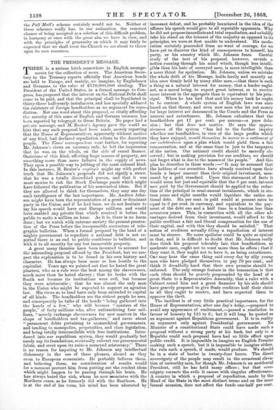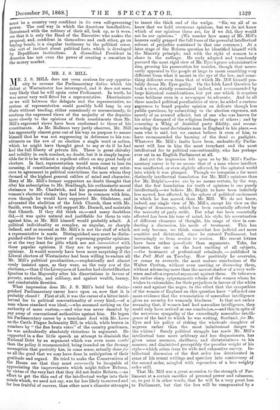THE PRESIDENT'S MESSAGE. T HERE is a serious hitch somewhere in
English arrange- ments for the collection of news. The American Secre- tary to the Treasury reports officially that American bonds are held in Europe, and mainly, we imagine, by Englishmen and Germans, to the value of £170,000,000 sterling. The President of the United States, in a formal message to Con- gress, has proposed that the interest on the National Debt shall cease to be paid, and that the principal shall be liquidated in thirty-three half-yearly instalments, and has specially adduced the existence of foreign bondholders as an argument for repu-, diation. Not one word about this proposal, so vitally affecting the security of this mass of English and German treasure, has been reported by telegraph to Great Britain. No paper had a private message, and M. Reuter's Agency gave the world no hint that any such proposal had been made, merely reporting that the House of Representatives, apparently without motive of any kind, had declared repudiation odious to the American people. The Times' correspondent went farther, for reporting Mr. Johnson's views on currency only, he left the impression that he was, on the whole, on the side of sound finance. Omissions of this kind, affecting huge masses of property, are something more than mere failures in the supply of news. They open a possible way to jobbing of the most colossal kind. In this instance, M. Reuter's emplogis might say with perfect truth that Mr. Johnson's proposals did not signify a straw, that he was a totally discredited person, and that it was most unwise to risk the Stock Exchange panic which might have followed the publication of his nonsensical ideas. But if they are allowed to think for themselves, they may one day omit intelligence of the last importance. Mr. Andrew John- son might have been the representative of a great or dominant party in the Union, and if he had been, we do not hesitate to say his speech would have cost Europe millions, and would have enabled any private firm which received it before the public to make a million an hour. As it is, there is no harm done ; but we watch with extreme anxiety the present prostra- tion of the Press before the irresponsible concoctors of tele- graphic bulletins. When a formal proposal by the head of a mighty government to repudiate a national debt is not re- ported there is an end to public confidence in bulletins, and with it to all security for any but immovable property.
A great many theories have been invented to account for the astounding proposal offered by the President, but we sus- pect the explanation is to be found in his own history and character. He has always been more or less hostile to the capitalist. Years ago we pointed out that he hated the great planters, who as a rule were the best among the slaveowners, much more than he hated slavery ; that he broke with the South not because its institutions were evil, but because they were aristocratic ; that he was almost the only man in the Union who might be expected to support an agrarian law. His views as to land have only been extended to capital of all kinds. The bondholders are the richest people he sees, and consequently he talks of the bonds " being gathered into the hands of a few," who will become "masters of the people," of forty millions who, after enfranchising four mil- lions, "merely exchange slaveowners for new masters in the shape of bondholders and tax-gatherers," and raves about " permanent debts pertaining to monarchical governments, and tending to monopolies, perpetuities, and class legislation, and being totally irreconcilable with free institutions. Intro- duced into our republican system, they would gradually but surely sap its foundations, eventually subvert our governmental fabric, and erect upon its ruins a moneyed aristocracy." There is no reason for imputing to Mr. Johnson any intellectual dishonesty in the use of these phrases, absurd as they seem to European economists. He probably believes them, and believing them, no consideration of results would for a moment prevent him from putting out the crudest ideas which might happen to be passing through his brain. He has always hated the rich, whom he now associates with the Northern cause, as he formerly did with the Southern. He is at the end of his term, his mind has been ulcerated by incessant defeat, and he probably luxuriated in the idea of the offence his speech would give to all reputable opponents. Why he did not propose immediateand total repudiation, and so boldly take his stand on the interest of the majority as opposed to its principles, we were at first unable to understand. His mode- ration certainly proceeded from no want of courage, for we have yet to discover the kind of consequences to himself, his party, or his country which Mr. Johnson fears. Careful study of the text of his proposal, however, reveals a notion running through his mind which, though less intelli- gible than his hate of moneyed men, is more intelligible than a mere thirst for spoliation. Mr. Johnson, unless we mistake the whole drift of his Message, holds hazily and muzzily an idea once firmly held by many abler men,—that there is such a thing as a natural interest for money, that a lender ought not, as a moral being, to expect great interest, or to receive more interest in the aggregate than is equivalent to his prin- cipal. When he has had that and his money back he ought to be content. A whole system of English laws was once based on that theory, and even now men who let out money for large interest are denounced in the Courts and the Press as usurers and extortioners. Mr. Johnson calculates that the bondholders get 17 per cent. per annum—a pure delu- sion ; but that does not matter. He says the oppres- siveness of the system "has led to the further inquiry whether our bondholders, in view of the large profits which they have enjoyed, would themselves be averse to a settlement of our indebtedness upon a plan which would yield them a fair remuneration, and at the same time be just to the taxpayers of the nation. Our national credit should be sacredly ob- served ; but in making provision for our creditors, we should not forget what is due to the masses of the people." And this plan he describes in these words :—"It may be assumed that the holders of our securities have already received upon their bonds a larger amount than their original investment, mea- sured by a gold standard. Upon this statement of facts it would seem but just and equitable that the 6 per cent. interest now paid by the Government should be applied to the reduc- tion of the principal in semi-annual instalments, which in six- teen years and eight months would liquidate the entire na- tional debt. Six per cent. in gold would at present rates be equal to 9 per cent. in currency, and equivalent to the pay- ment of the debt one and a half time in a fraction less than seventeen years. This, in connection with all the other ad- vantages derived from their investment, would afford to the public creditors a fair and liberal compensation for the use of their capital, and with this they should be satisfied." That notion of creditors actually liking a repudiation of interest must be sincere. No mere spoliator could be quite so cynical as that, and it is difficult to doubt that Mr. Johnson really does think his proposal tolerably fair, that bondholders, as moderate men, ought not to want more than he offers ; that if they want it, they ought not to have it, as being extortioners. One may hear the same thing said every day by silly young men who have pledged themselves to pay 70 per cent., and think it dreadfully hard that their own promise should be enforced. The only strange feature in the transaction is that such ideas should be gravely propounded by the head of a great State to a Representative Assembly, that a ruler with a Cabinet round him and a great financier by his side should have gravely proposed to give State creditors half their claim as all they ought to receive, and have expected them to approve the theft.
The incident is of very little practical importance, for the House of Representatives, after one day's delay,—proposed to avoid any appearance of excitement,—passed a resolution in favour of honesty by 125 to 6 ; but it will long be quoted as an argument against Republican government. It is in reality an argument only against Presidential government. No Minister of a constitutional State could have made such a proposal without a strong party at his back, but only in a Republic could such proposal have had so little effect upon public credit. It is impossible to imagine an English Premier making such a speech, but it is impossible to imagine either, the ruin such a speech, if made, would produce. We should be in a state of barter in twenty-four hours. The direct sovereignty of the people may result in the occasional eleva- tion of unworthy men, for though Mr. Johnson is an accidental President, still he has held many offices ; but that sove- reignty corrects the evils it causes with singular effectiveness. A country in which a proposal of repudiation, made by the Head of the State in the most distinct terms and on the most formal occasion, does not affect the funds one-half per cent. must be a country very confident in its own self-governing power. The cool way in which the American bondholders, threatened with the robbery of their all, look up, as it were, see that it is only the Head of the Executive who makes the proposal, and, confident in themselves and each other, go on bonds, is a singular testimony to the political sense, buying the sort of instinct about political facts, which is developed by Republican institutions. A discredited President in America has not even the power of creating a sensation in the money market.



































 Previous page
Previous page